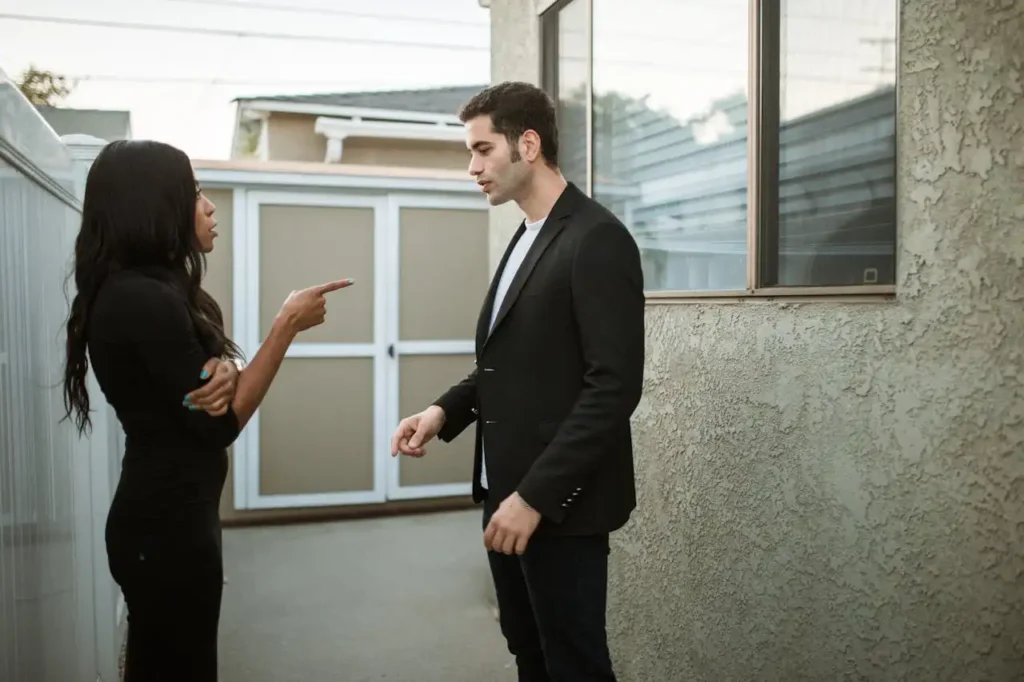8 Signs He Doesn’t Care About The Relationship
Recognizing when someone has emotionally checked out of a relationship can be painful but necessary.
These warning signs help you understand when your partner’s behavior indicates decreasing investment in your connection.
Pay attention to patterns rather than isolated incidents, as everyone has off days or stressful periods.
Consistent changes in behavior often reveal deeper shifts in priorities and feelings.
Understanding these signs empowers you to make informed decisions about your relationship’s future and your own emotional well-being.
Sign 1: He Stops Communicating Effectively

Communication breakdown often signals the beginning of relationship decline. You might notice conversations becoming increasingly surface-level and functional.
When he stops sharing his thoughts, feelings, and daily experiences with you, it indicates emotional withdrawal.
He responds to your questions with minimal effort, offering short answers that don’t invite further discussion.
Instead of engaging in meaningful conversations about your relationship, future plans, or even daily events, he seems distracted or disinterested.
Text messages become brief and infrequent. The warmth and personality disappear from his communication style.
Where he once sent thoughtful messages throughout the day, now you receive only necessary information about logistics or schedules.
When you try to discuss relationship concerns or share important news, he changes the subject quickly or seems mentally absent.
This avoidance of deeper communication suggests he’s no longer invested in maintaining emotional intimacy with you.
Sign 2: He Doesn’t Make Time for You
Time allocation reveals true priorities in any relationship. If he consistently chooses other activities over time with you, this indicates shifting priorities.
When someone cares deeply about their partner, they prioritize spending quality time together despite busy schedules.
He cancels plans frequently, often at the last minute, and doesn’t suggest alternative times to reschedule.
Work, friends, hobbies, or even leisure activities like watching sports or playing video games take precedence over your relationship.
You find yourself competing for his attention with everything else in his life.
Even when you’re physically together, he might be mentally elsewhere, checking his phone, thinking about work, or seeming restless and eager to do something else.
Weekend plans that once included you now revolve around his individual interests or social circle.
He makes commitments and schedules without considering your availability or including you in the decision-making process.
Sign 3: He Shows No Interest in Your Life

A caring partner stays curious about your experiences, goals, dreams, and daily activities.
When he stops asking about your work, friendships, family, or personal interests, it signals emotional disconnection from your world.
He doesn’t remember important details you’ve shared about upcoming events, challenges you’re facing, or achievements you’re celebrating.
This forgetfulness often stems from lack of attention rather than poor memory, indicating he’s not fully present during your conversations.
Your hobbies, career developments, or personal growth no longer capture his interest.
He might nod politely when you share news but doesn’t ask follow-up questions or show genuine enthusiasm about things that matter to you.
When you’re dealing with stress, illness, or difficult situations, he provides minimal support or seems inconvenienced by your needs.
A partner who cares remains invested in your well-being and offers emotional support during challenging times.
Sign 4: He Avoids Making Future Plans
Partners who value their relationship naturally discuss and plan for the future together.
When he becomes evasive about making plans beyond the immediate present, it suggests uncertainty about the relationship’s longevity.
He deflects conversations about upcoming vacations, holiday celebrations, or major life decisions. Even short-term social commitments become problematic.
Instead of planning together, he keeps his options open and avoids commitments that extend more than a few weeks into the future.
Long-term discussions about living arrangements, career decisions, family planning, or shared goals make him uncomfortable.
He might change the subject or give vague responses when you try to discuss these important topics.
He hesitates to RSVP for events, declines invitations that require advance planning, or suggests you make plans without including him in the decision-making process.
Sign 5: He Doesn’t Put Effort into the Relationship

Healthy relationships require ongoing effort from both partners to maintain connection and romance.
When he stops investing energy in thoughtful gestures, special occasions, or relationship maintenance, it indicates decreased caring.
Date nights become rare or nonexistent, and when they do happen, he puts minimal thought into planning.
Instead of creative or romantic activities, you might find yourselves defaulting to the easiest or most convenient options.
He forgets important dates like anniversaries, birthdays, or other meaningful occasions.
Even when reminded, he doesn’t put thought into gifts, celebrations, or ways to make these moments special for you.
Problem-solving discussions about relationship issues become one-sided. Small daily gestures that once showed care disappear from his routine.
He doesn’t contribute ideas for improvement, shows little interest in working through challenges, or seems resigned to letting problems persist without resolution.
He no longer does little things that made you feel loved and appreciated, treating the relationship more like a habit than a choice.
Sign 6: He Becomes Emotionally Distant
Emotional intimacy requires vulnerability and openness between partners. He becomes defensive or dismissive when you express concerns about the relationship.
When he builds walls around his feelings and stops sharing his inner world with you, it creates distance that’s difficult to bridge.
Instead of listening to your feelings and working toward solutions, he minimizes your concerns or becomes irritated by emotional conversations.
Physical presence doesn’t guarantee emotional availability. His body language changes when you’re together.
Even when you’re together, he seems mentally distant, going through the motions without genuine engagement or connection.
He might maintain physical distance, avoid eye contact during serious conversations, or seem restless when you’re trying to connect emotionally.
You feel like you’re talking to a stranger rather than your partner. The emotional connection that once felt natural and easy now requires effort that isn’t reciprocated.
Sign 7: He Prioritizes Everything Else Over You

When someone cares about their relationship, their partner ranks high among their priorities.
If you consistently feel like an afterthought in his life, this reveals where you stand in his value system.
Work demands, social obligations, family commitments, and personal interests always seem to take precedence over your needs or your relationship.
While balance is important, consistent reprioritization sends a clear message.
He makes unilateral decisions about his time and commitments without considering how they affect you or your relationship.
Your input becomes irrelevant to his decision-making process. He cancels plans easily but struggles to say no to other people or activities.
Emergency situations or last-minute opportunities always seem more important than time with you.
You find yourself accommodating his schedule constantly while he rarely adjusts his plans to accommodate your needs or preferences.
This one-sided flexibility indicates imbalanced investment in the relationship.
Sign 8: He Stops Showing Affection
Physical and verbal affection naturally flows from someone who feels connected and caring toward their partner.
When affectionate gestures become rare or feel forced, it indicates emotional withdrawal. Casual physical touch disappears from your interactions.
He no longer reaches for your hand, gives spontaneous hugs, or engages in the small physical connections that maintain intimacy between partners.
Verbal expressions of love become infrequent or sound automatic rather than heartfelt. Romantic gestures become nonexistent.
“I love you” might be said out of habit rather than genuine feeling, lacking the warmth and sincerity it once carried.
He no longer surprises you with flowers, writes sweet notes, or does thoughtful things that show he’s thinking about you when you’re apart.
Sexual intimacy changes significantly, becoming less frequent or feeling disconnected.
Physical intimacy might become purely physical without the emotional connection that once made it meaningful.
Understanding the Bigger Picture
These signs often appear gradually rather than all at once. Personal problems don’t excuse complete emotional withdrawal from a relationship.
Pay attention to patterns over time rather than isolated incidents, as stress, work pressure, or personal challenges can temporarily affect anyone’s behavior in relationships.
Consider the possibility of underlying issues like depression, anxiety, work stress, or family problems that might be affecting his behavior.
Sometimes emotional withdrawal stems from personal struggles rather than decreased feelings for you.
However, regardless of the cause, you deserve a partner who communicates openly about challenges and works with you to maintain connection during difficult times.
Trust your instincts about changes in your relationship dynamic. If multiple signs resonate with your experience, it’s worth addressing these concerns directly with your partner.
What to Do with This Information
Use these observations as starting points for honest conversations about your relationship.
Approach the discussion with curiosity rather than accusation, giving him opportunity to explain changes you’ve noticed.
Express your needs clearly and ask for specific changes rather than vague requests for improvement. Set a timeline for seeing improvement after addressing these issues.
If he cares about the relationship, he’ll make effort to address your concerns and restore connection.
Lasting change takes time, but you should see genuine effort and some positive changes relatively quickly if he’s committed to the relationship.
Consider couples counseling if both of you want to work on the relationship but struggle to communicate effectively or make progress on your own.
Protecting Your Own Well-Being
Don’t lose yourself trying to revive a relationship where you’re the only one investing effort.
Your emotional health and self-worth matter more than maintaining a connection that no longer serves you.
Maintain your own friendships, interests, and goals regardless of his level of investment in the relationship.
Don’t sacrifice your identity or happiness hoping to win back his attention. Know your own worth and what you deserve in a loving partnership.
Recognize that you cannot single-handedly save a relationship or force someone to care. Real love and commitment must come voluntarily from both partners.
If these signs persist despite your efforts to address them, it may be time to consider whether this relationship aligns with your values and needs.
Conclusion
These eight signs reveal declining investment in your relationship.
Trust your observations and prioritize your emotional well-being while deciding next steps.







